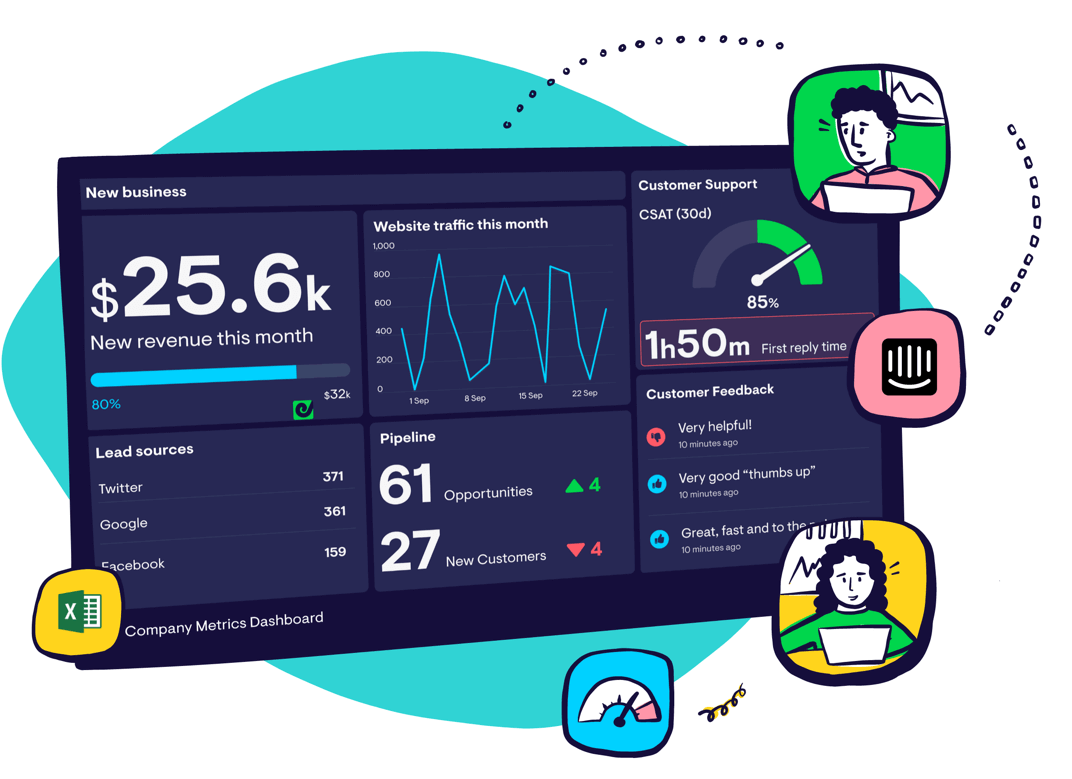Net MRR Growth Rate
What is Net MRR Growth Rate?
Net Monthly Recurring Revenue (MRR) Growth Rate measures the month over month percentage increase in net MRR. It’s one of the most common and important SaaS metrics. Since MRR changes as new revenue is added and customers churn, upgrade or downgrade, the growth rate shows the net variation of those factors from month-to-month. The net growth rate provides a solid indicator of how quickly your SaaS company is growing.
Advice from VCs: Why Net MRR Growth Rate is critical
“MRR Growth Rate is one of the the top metrics SaaS companies should track because it answers the question ‘How fast is the company growing?’” - Tom Tunguz, Partner at Redpoint Ventures
“To me, [Net MRR Growth] is the foundation of any healthy business. If a company can’t reach a sustainable ratio of 3.5-4x more added MRR than lost MRR, the business can’t ‘get legs.’” - Alexander Bruehl, Angel Investor at BM Advisors
How to calculate Net MRR Growth Rate:
Net MRR Calculation:
($) Existing MRR + ($) new business + ($) reactivation + ($) expansion - ($) churn - ($) contraction = ($) Net MRR
Net MRR Growth Rate calculation:
[ ($) Net MRR Month B - ($) Net MRR Month A ] / ($) Net MRR Month A X 100 = (%) MRR Growth Rate
Calculating Net MRR Growth Rate starts by understanding your Net MRR. First, add your existing MRR, new business, reactivation, and expansion MRR. Then take that sum and subtract churn and downgrades to get your Net MRR. Run this calculation for at least this month and last month (obviously, you can calculate this for all previous months if you want to see a longer trend).
Once you have the Net MRR for at least the past two months, calculate the growth rate by subtracting the first month Net MRR from the second month Net MRR. Divide the result by the first month MRR and then multiply by 100 to turn it into a percentage. For example, if you have $1000 MRR the first month and $3500 the second month, your growth rate would be 250%.
($3500 - $1000) / $1000 x 100 = 250%
Pros:
As a more contextual metric, Net MRR Growth Rate helps SaaS companies measure comparative progress (month-over-month) instead of an absolute figure (Net MRR), which can be deceiving if tracked by itself. Not only is the growth rate helpful for founders, but investors are also keen to see this metric as they evaluate the startup’s current and potential growth.
Cons:
The month-over-month growth rate can be misleading for very early stage startups since it’s likely that they will see exponential growth at the beginning. The mistaken expectation is that the growth rate will stay the same or even increase, when in reality, the growth rate often decreases (from the initial exponential rate) as the company matures.
For example, a startup might have a growth rate of 150%, 76%, and 88% over the first couple months. But at this point, it’s too early to determine what a sustainable growth rate will be. It’s quite likely the growth rate will drop as the company matures. When measuring the Net MRR Growth Rate, calculate a longer trend (12-18 months) to ensure your percentages reflect an accurate trend and not a one-time exponential growth curve.
Relevant SaaS Metrics and KPIs:
If you’re adding Net MRR Growth Rate to your SaaS dashboard, you might want to also consider tracking these related SaaS metrics for context.
Industry Benchmarks
Growth rate benchmarks vary by company stage but on average, companies fall between 15% and 45% for year-over-year growth. Businesses with less than $2 million in annual revenue generally have much higher growth rates according to a Pacific Crest SaaS Survey.
Startups seeking post-seed/pre-series A funding should target a 15%+ Net MRR Growth Rate (month-over-month).
Additional Notes
Christoph Janz, Co-founder and Managing Partner at Point Nine Angel VC, has put together a helpful, free planning tool for startup founders to cross-check their estimated MRR growth for the coming year.
“The ability to accelerate monthly revenues while decreasing monthly burn is the #1 thing I look for in a growth stage business.” - Steve Schlenker, Managing Partner at DN Capital
